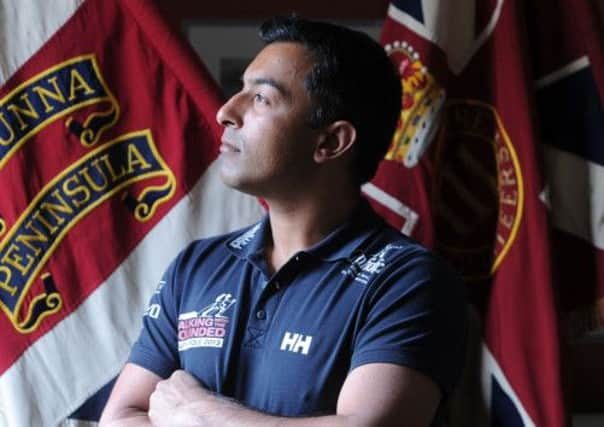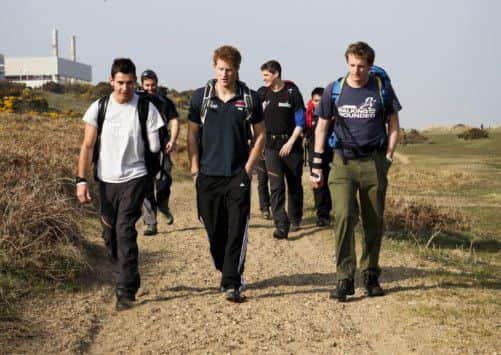‘We were shoulder to shoulder in battle and we are in rehabilitation as well’


THE Yorkshire Regiment’s headquarters is a treasure trove for military history fans.
In one of its rooms in York, the regimental colours are draped proudly on display, while paintings of past battles in exotic sounding places like Famars and Bhurtpore adorn the walls. But bravery often comes at a price and the recent conflicts in Iraq and Afghanistan have proved that wars, even modern ones, still produce casualties.
Advertisement
Hide AdAdvertisement
Hide AdCaptain Ibrar Ali is among those who have put their lives on the line. He was badly injured while serving in the Yorkshire Regiment in 2007 when his patrol was hit by a roadside bomb. One of his colleagues was killed in the attack in which he lost his right arm.


Captain Ali, or “Ibi” as he prefers to be called, recovered and just 18 months later he was back on tour with the army in Iraq. But now he’s taking on a new challenge, swapping the heat of the Middle East for the freezing temperatures of Antarctica.
The 35 year-old from York is part of a team of wounded British servicemen and women taking part in a race to the South Pole along with teams from the United States and the Commonwealth. The 208-mile (335km) Walking With The Wounded South Pole Allied Challenge takes place in November and December this year.
It’s the third expedition the Walking With The Wounded charity has organised and sees Prince Harry joining Ibi and three other injured service personnel in the Glenfiddich-sponsored British team. The aim is to raise money for the organisation which supports injured servicemen.
Advertisement
Hide AdAdvertisement
Hide AdIbi says he’s proud to be involved. “It captures the essence of the fact that we were shoulder to shoulder in battle and we are in rehabilitation as well.” Prince Harry took part in the charity’s trek to the North Pole in 2011 and having him on board is a huge boost.
“It raises the expedition’s profile to the nth degree,” says Ibi, sitting in his regiment’s HQ. “He’s completed two tours in Afghanistan and generates a huge amount of interest which can only help the servicemen that we’re trying to support.”
So what is he like? “I met him very briefly at the launch and he seems very down to earth. He’s a fellow officer in the British Army who likes a laugh and a joke with the rest of us.”
The expedition, which is being filmed for a TV documentary, will test their mettle. For even though they’re heading out during the Antarctic summer it will still be bitterly cold with temperatures anything from minus five to minus 50 degrees, and winds of up to 50 mph. “I think the cold is going to be the biggest challenge. I’m used to working in warmer climates, although being a Yorkshireman that’s not something bred into us, so that’s going to be tough.”
Advertisement
Hide AdAdvertisement
Hide AdAnother issue, he says, is one of pride. “I’ve been quite lucky because after being injured I’ve been able to continue serving. But training for this expedition has meant that at times I’ve had to suck in my pride and ask for help.” He won’t be wearing his prosthetic arm while trekking on the ice which makes ordinary everyday things more difficult. “It’s little things like doing up your boot laces when it’s minus 50 and the wind’s blowing a gale. You only need a few seconds of exposure in these kind of conditions and you’ve got frostnip which means you become a liability to the team. So there will be times when I’ll just have to ask one of the team to lend a hand.”
It’s something they will all have to do. “I’m the only one on the team with both legs so there might be times when I could be asked to carry a bit of extra kit just to balance things out. Which is what you do when you’re in a team.”
Ibi and his colleagues have already had a flavour of what’s in store for them after a gruelling training camp in Iceland. “We spent five days out on the ice and when you’re on your feet for 10 hours a day, it can be quite taxing both physically and mentally. To do that for 17 days at the South Pole will be tough.”
Ibi ended up in the army through happenstance. He studied law at university and was in his second year when his life changed direction. “I’ve always been an outdoors sort of man and I didn’t want to get a job stuck in an office. It was just by chance that I was walking past an Armed Forces careers office one day and had a look in and noticed that, as a graduate, I could be eligible to go to Sandhurst to become an officer.”
Advertisement
Hide AdAdvertisement
Hide AdHis curiosity piqued, he joined the Territorial Army and loved it. He joined The Prince of Wales’s Own Regiment of Yorkshire in 2004 and went on his first tour to Iraq in October 2006. He was based at Basra which was in the grip of a violent insurgency.
“You felt something was wrong if a day went by when you weren’t attacked by rockets and mortars,” he says.
Improvised Explosive Devices (IEDs) were becoming a growing threat and in February 2007, Ibi’s patrol was hit by three roadside bombs.
He remembers the incident vividly. “It was a Friday morning coming up to lunchtime. Myself and 11 other men were travelling back from a patrol and an IED detonated against my vehicle.
Advertisement
Hide AdAdvertisement
Hide Ad“The driver in my vehicle, Private Simpson from Howden, was killed. My right arm was pretty much amputated, my left wrist was badly injured and a chunk of my right was missing.”
A soldier in the back of the vehicle also lost his right leg and another was showered with shrapnel.
Thankfully the soldiers in the other two vehicles escaped without serious injury, but Ibi now faced coming to terms with his life-changing injuries. He is one of six children from Rotherham and says his family helped him back on his feet. “I’m a father now myself so I can’t imagine what my parents went through.
“I was lucky to be so well supported by my family and friends and the regiment. But you do consider the little things in life, like I’m never going to play cricket for the battalion again,” he says.
Advertisement
Hide AdAdvertisement
Hide Ad“So I was fussed over for a short period but being a staunch Yorkshire family it was a case of ‘right, get on with it now’.”
Remarkably, just 18 months after being wounded he was back on duty in Iraq. Most people wouldn’t have been able to return, never mind wanted to. “I think with the right support you can do anything and the body will go wherever the mind puts it,” he says.
“It would have been quite easy to have left the Army at that point with my head held high, but I was given the opportunity to stay and I’ve always loved my job and I didn’t want to do anything else.”
At times he sounds like a one-man advert for a career in the Army, but he says it’s only because he’s enjoyed it so much. “They are a gender blind, ethnicity blind, disability blind employer. If you are able to do your job then that’s what counts. I’m sure there are many civilian employers that may not have kept me on and given me the care, because hundreds of thousands [of pounds] have been spent on ensuring that I got through rehabilitation.”
Advertisement
Hide AdAdvertisement
Hide AdAs well as returning to Iraq, last year he spent six months at his battalion’s HQ out in Afghanistan. But he was well aware of the risks involved. “There’s not a soldier out there who doesn’t consider they might be injured, but I’m at no more risk than the next man and I’m no more precious than the next person. I’m sure the media would have had a field day if I’d been injured a second time, but it’s not about that. It’s about my soldiering ability and I wasn’t a liability to the guys on the ground.”
His affinity with those he’s served alongside clearly runs deep, which is why the forthcoming expedition is so important to him. “It’s a special breed of individual that volunteers and puts their body on the line and I think I need to give a little back, because I’ve been very blessed with my career.”
He also wants to highlight the problems of post traumatic stress disorder (PTSD) that can afflict servicemen and women. “I’ve got friends that have suffered from PTSD and the statistics are horrendous. The number of people suffering from this who end up in the prison system or homeless, is shocking. So if we can do something to raise awareness about this then that’s great.”
Walking with the wounded
Walking With The Wounded is a UK-based charity which funds the re-training and re-education of wounded servicemen and women with the aim of helping them find long- term employment after leaving the Armed Forces.
Advertisement
Hide AdAdvertisement
Hide AdThe organisation stages extreme expeditions to illustrate the extraordinary determination and courage of these injured individuals, using this platform to draw attention to the need to help in their career transition, and to raise funds for charity.
Previous expeditions have included the North Pole in 2011 and, last year, Mount Everest.
Visit: www.walkingwith thewounded.org.uk